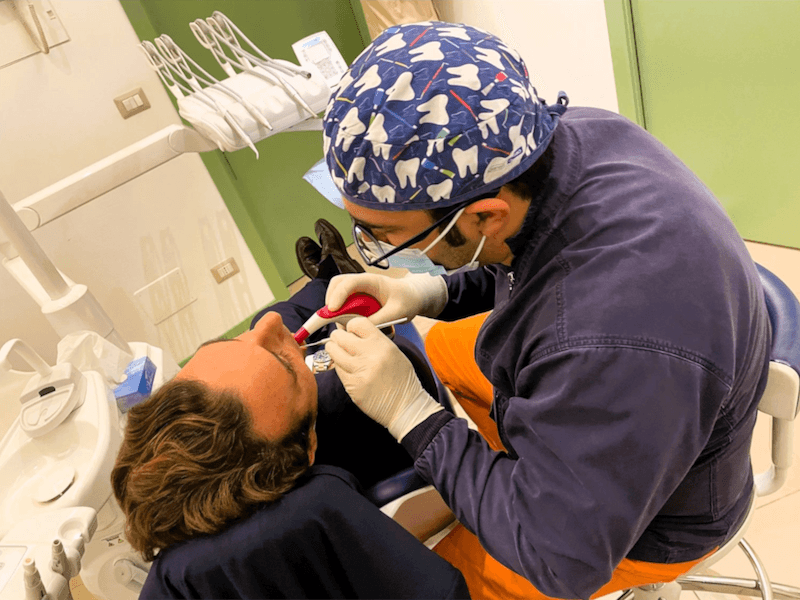Although the negative effects of cigarette smoking on oral health and tooth discoloration are well-known, there is only limited data about the impact of combustion-free nicotine alternatives like e-cigs and heated tobacco products. In particular, there are no long-term studies assessing the impact on oral health and teeth appearance when substituting conventional cigarettes for these combustion-free nicotine delivery alternatives.
The study was specifically designed to address these research questions. In particular, this study tests the hypothesis that avoiding exposure to cigarette smoke toxins may translate into measurable amelioration in gingival response, dental plaque build-up, enamel discoloration, and tooth staining in subjects with mild-moderate gingivitis by comparing subjects who smoke tobacco cigarettes with those who switch to using combustion-free products or subjects who never smoked.
The study has been designed with the help of experts from Germany, UK, Italy, Poland, Moldova, and Indonesia. SMILE study is being conducted in four dental clinics across four different countries (Italy, Poland, Moldova, and Indonesia). Volunteer enrollment was completed in August 2023 and results will be expected to be available in 2025.
The primary objective of the study is to compare the percentage mean change in the Modified Gingival Index (MGI) score, a key indicator of gingival health, between baseline and the 18-month follow-up among the study groups. Secondary outcomes will evaluate variations in tooth staining, dental discoloration, plaque scores, and quality of life assessments related to oral health.

“This ambitious project is poised to provide, for the first time, a comprehensive evaluation of the potential benefits or risks associated with combustion-free nicotine alternatives. With a commitment to excellence, we have implemented standardized training protocols for evaluating a range of dental health metrics across four countries on two continents, ensuring the highest quality of scientific research. The study’s results, expected in 2025, promise to offer new hope for individuals seeking healthier smoking alternatives and the prospect of a brighter smile” – explains prof. Eugenio Pedullà, of the University of Catania, and Project Leader of SMILE Study.

The SMILE study is characterized by unique innovative solutions. This study introduces a novel approach to smoking cessation by offering a diverse range of popular combustion-free nicotine alternatives, allowing participants to choose based on personal preference, aiming to enhance adherence and reduce cigarette smoking. Additionally, the SMILE study examines the impact of switching to combustion-free nicotine alternatives on oral health, including gum health, bad breath, and the appearance of teeth, using modern cutting-edge technologies like digital spectrophotometry and Quantitative Light-induced Fluorescence (QLF) for objective measurement. The study emphasizes the importance of personal oral hygiene and dietary patterns, ensuring consistent measurement and adherence to the research protocol.

Prof. Iain Chapple, Professor and Head of Periodontology within the School of Dentistry at the University of Birmingham, noted: “By integrating innovative, cutting-edge technology for the objective and consistent quantification of oral health parameters, we are establishing unprecedented high-quality standards in dental research. This advancement will bolster confidence in the applicability and value of our approach across a diverse array of applications. These include clinical and regulatory research focused on combustion-free nicotine products and smoking cessation medications to help people quit cigarette smoking, as well as consumer care products aimed at oral hygiene and dental aesthetics.”
Data from this study will provide valuable key insights into the potential benefit and/or risks associated with the regular long-term use of combustion-free nicotine alternatives. In addition, findings may have important implications for reducing smoking burden globally, especially for those smokers for which bad breath and/or poor dental aesthetics are a significant concern. For these individuals, an oral-centric narrative (such as achieving a healthier and brighter smile) may serve as a more compelling reason to quit smoking than the fear of future lung cancer or cardiopulmonary diseases.

According to prof. Riccardo Polosa, Founder of the CoEHAR: “Major health organizations in the UK support the use of electronic cigarettes, emphasizing the lack of evidence that these products cause tooth decay or gum disease. Recently, CoEHAR researchers have published that tar-free nicotine delivery devices, like electronic cigarettes or heated tobacco products, can improve the aesthetic appearance of teeth and reduce the formation of dental plaque. The SMILE study seeks to definitively clear up false claims about vaping and oral health, making a significant contribution in the fight against smoking by also actively engaging dental clinics and offices around the world.”




